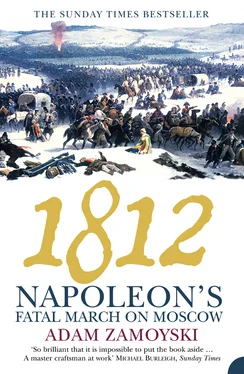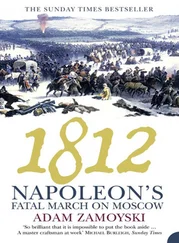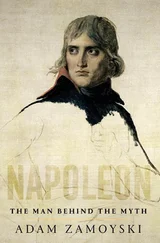The twenty-year-old Empress Marie-Louise had felt the first pains at around seven o’clock on the previous evening. Dr Antoine Dubois, Premier Accoucheur of the Empire, was on hand. He was soon joined by Dr Corvisart, the First Physician, Dr Bourdier, the Physician-in-Ordinary to the Empress, and Napoleon’s surgeon Dr Yvan. The Emperor, his mother and sisters, and the various ladies of the Empress’s household brought to twenty-two the number of those attending her, either in her bedroom or in the next chamber.
Beyond that, the salons of the Tuileries were filled with some two hundred officials and dignitaries, who had been summoned at the first signs of the Empress going into labour and stood about awkwardly in full court dress. Every now and then, one of the ladies-in-waiting on duty would come out and give them a progress report. As the evening wore on, small tables were brought in and they were served a light supper of chicken with rice washed down with Chambertin. But the banter was subdued: things were clearly not proceeding smoothly in the Empress’s bedroom. At about five in the morning the Grand Marshal of the Empire came out and informed them that the pains had ceased and the Empress had fallen asleep. He told them they could go home, but must remain on call. Some went, but many of the exhausted courtiers stretched out on benches or rolled up carpets into makeshift mattresses and lay down on them in all their finery to snatch some sleep.
Napoleon had been with Marie-Louise throughout, talking to her and comforting her with all the solicitude of a nervous father-to-be. When she fell asleep Dubois told him he could go and take some rest. Napoleon could do without sleep. His preferred means of relaxation was to lie in a very hot bath, which he believed in as a cure for most of his ailments, be it a cold or constipation, from which he suffered regularly. And that is what he did now.
He had not been luxuriating in the hot water for long when Dubois came running up the concealed stairs that led from his apartment to the Empress’s bedroom. The labour pains had started again, and the doctor was anxious, as the baby was presenting itself awkwardly. Napoleon asked him if there was any danger. Dubois nodded, expressing dismay that such a complication had occurred with the Empress. ‘Forget that she is Empress, and treat her as you would the wife of any shopkeeper in the rue Saint Denis,’ Napoleon interrupted him, adding: ‘And whatever happens, save the mother!’ He got out of his bath, dressed hastily and went down to join the doctors at his wife’s bedside.
The Empress screamed when she saw Dubois take out his forceps, but Napoleon calmed her, holding her hand and stroking her while the Comtesse de Montesquiou and Dr Corvisart held her still. The baby emerged feet first, and Dubois had a job getting the head clear. After much pulling and easing, at around six in the morning he delivered it. The baby appeared lifeless, and Dubois laid it aside as he and the others attended to the mother, who seemed to be in danger. But Corvisart picked up the child and began to rub him briskly. After about seven minutes of this he came to life, and the doctor handed him to the Comtesse de Montesquiou, with the comment that it was a boy. Napoleon, who could see that Marie-Louise was by now out of danger, took the baby in his arms and, bursting into the adjoining room where all the senior officers of the Empire were gathered, expecting the worst, exclaimed: ‘Behold the King of Rome! Two hundred cannon shots!’
But when his sister-in-law, Queen Hortense, came up to congratulate him a moment later, he replied: ‘I cannot feel the happiness – the poor woman has suffered so much!’ 5He meant it. They had been married for just one year, and the arranged match had quickly turned into an almost cloyingly loving relationship. One of thirteen children of the Austrian Emperor Francis II, Marie-Louise had been her father’s favourite, his ‘ adorable poupée ’. She had been brought up to hate Napoleon and to refer to him as ‘the Corsican’, ‘the usurper’, ‘Attila’ or ‘the Antichrist’. But, when diplomacy demanded it, she bowed to her father’s will. And once she had tasted the pleasures of the marital bed there was no restraining her enthusiasm for the Emperor. Napoleon, who had been thrilled at the idea of having in his bed ‘a daughter of the Caesars’, as he referred to her – and one half his age – quickly became moonstruck, and their marriage turned into a middle-class idyll.
That evening, as the capital celebrated, the child was baptised according to the age-old rites of the French royal family. The next day Napoleon held a grand audience, seated on the imperial throne, to receive formal congratulations. The entire court then accompanied him to see the infant, who lay in a superb silver-gilt cradle presented by the city of Paris. It had been designed by the artist Pierre Prudhon and represented a figure of Glory holding a triumphal crown and a young eagle ascending towards the bright star which symbolised Napoleon. The chancellors of the Légion d’Honneur and of the Iron Cross laid the insignia of both orders on cushions beside the sleeping child. The painter François Gérard set to work on a portrait.
Over the next days homage of every kind poured in, and cities throughout the country joined Paris in celebrating as the news reached them, each in turn sending a delegation to deliver its congratulations. The same process was repeated as the news rippled out to the more far-flung parts of the Empire and to other countries. Such expressions were to be expected in the circumstances. But there was a great deal more to the celebrations and congratulations than just loyal humbug – to most Frenchmen the birth of a boy heralded a period of peace and stability, and much more besides.
France had been at war virtually without interruption for nineteen years. She had been attacked, in 1792, by a coalition of Prussia and Austria. Over the next years these were joined by Britain, Spain, Russia and other lesser powers, all of them bent on defeating revolutionary France and restoring the Bourbon dynasty. It was not a fight over territory. It was an ideological struggle over the future order of Europe. Atrocities aside, revolutionary France had brought into public life all the ideals of the Enlightenment, and her very existence was seen by the monarchical powers as a threat to theirs. She had made ample use of this weapon in order to defend herself, by exporting revolution and subverting provinces belonging to her enemies. She had gradually turned from victim to aggressor, but she was nevertheless fighting for survival. Revolutionary France could not secure a lasting peace, as virtually every other power in Europe would not reconcile itself to the survival of the republican regime, and felt a necessity to destroy it.
General Napoleon Bonaparte’s seizure of power in Paris in November 1799 should have broken this vicious circle of fear and aggression. He reined in the demagogues, closed the Pandora’s box opened by the revolution and tidied up the mess. Being a child of the Enlightenment as well as a despot, he mobilised the energies of France and harnessed them to the task of building a well-ordered, prosperous and powerful state, the ‘ état policé ’ of which the philosophes of the Enlightenment had dreamed. He was following in the footsteps of rulers such as Frederick the Great of Prussia, Catherine the Great of Russia and Joseph II of Austria, who had introduced social and economic reforms while strengthening the framework of the state, and who were universally admired for this. But to their successors, Bonaparte was but a grotesque upstart, a malignant outgrowth of the evil revolution.
By 1801, following a series of resounding victories, Bonaparte was able to force peace on all the powers of the European continent. France’s security was guaranteed by expanded frontiers and the creation of a series of theoretically autonomous republics in northern Italy, Switzerland and Holland which were in fact French provinces. In March 1802 Bonaparte even concluded the Peace of Amiens with Britain. But this was not likely to last.
Читать дальше












